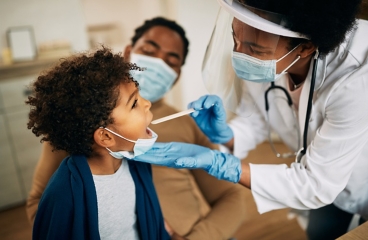Coronavirus (COVID-19) in Children: Care Instructions
Overview

The coronavirus disease (COVID-19) is caused by a virus. Symptoms may include a fever, a cough, and shortness
of breath. Your child may also have a stomachache or belly pain and may not feel like eating.
COVID-19 can spread through droplets from coughing, sneezing, breathing, and singing. It also can spread when
people are in close contact with someone who is infected.
Some children have no symptoms. But most children have mild symptoms and can be cared for at home. If
symptoms get worse, they may need care in a hospital. Treatment may include medicines to reduce symptoms, plus
breathing support such as oxygen therapy or a ventilator.
It's important to not spread the virus to others. If your child has COVID-19, they should:
-
Wear a mask anytime they're around other people. A mask can help stop the spread of the virus. Children
under 2 years of age should not wear a mask.
-
Stay away from others in the home. When possible, your child should stay in a separate bedroom and use a
separate bathroom.
-
Stay home. Your child should only leave home to get medical care.
Follow-up care is a key part of your child's treatment and safety. Be sure to make and go to all
appointments, and call your doctor if your child is having problems. It's also a good idea to know your
child's test results and keep a list of the medicines your child takes.
How can you care for your child at home?
-
Make sure your child gets extra rest. It can help them feel better.
-
Have your child drink plenty of fluids. This helps replace fluids lost from fever, vomiting, or diarrhea.
Fluids may also help ease a scratchy throat.
-
If your doctor prescribed medicine for COVID-19, give it to your child exactly as directed.
-
Ask your doctor if you can give your child acetaminophen (Tylenol) or ibuprofen (Advil, Motrin) for fever
or muscle and body aches. Do not use ibuprofen if your child is less than 6 months old unless the doctor
gave you instructions to use it. Be safe with medicines. Read and follow all instructions on the label. Do
not give aspirin to anyone younger than 20. It has been linked to Reye syndrome, a serious illness.
-
Use petroleum jelly on your child's sore skin. This can help if the skin around their nose and lips
becomes sore from rubbing a lot with tissues. If your child is using oxygen, use a water-based product
instead of petroleum jelly.
-
Keep track of symptoms such as fever and shortness of breath. This can help you know if you need to call
your doctor. Ask your doctor when it's safe for your child to be around other people.
How can you protect yourself?
Wear a mask around other people and around the child who is sick. Wash your hands often and well. Use soap
and water, and scrub for at least 20 seconds. Get tested for COVID-19. You may need more than one test. If you
test positive, isolate and call your doctor.
When should you call for help?
 Call 911
anytime you think your child may need emergency care. For example, call if your child has life-threatening
symptoms, such as:
Call 911
anytime you think your child may need emergency care. For example, call if your child has life-threatening
symptoms, such as:
Call your child's doctor now or seek immediate medical care if:
|
|
|
|
|
|
|
|
|
|
|
-
Your child has an ongoing fever with new or worsening: belly pain, vomiting, diarrhea, rash, red
eyes, or dizziness. These may be symptoms of MIS-C, a condition associated with COVID-19.
|
Watch closely for changes in your child's health, and be sure to contact your doctor if:
If you go to the doctor's office, wear a mask. Children under 2 years of age
should not wear a mask.
Current as of: February 28, 2024
Content Version: 14.0
Care instructions adapted under license by your
healthcare professional. If you have questions about a medical condition or this instruction, always ask
your healthcare professional. Healthwise, Incorporated disclaims any warranty or liability for your use of
this information.